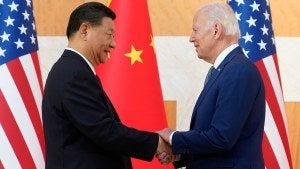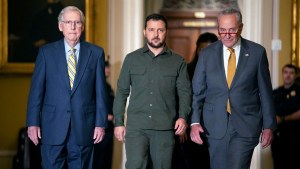The ongoing war in Ukraine continues to impact American attitudes toward global engagement.
The 2023 Chicago Council Survey, conducted September 7–18, finds US involvement in the war between Russia and Ukraine has played a role in American attitudes on foreign policy. Though still considerable, support for continued assistance to Kyiv has slipped from previous readings, and public support has also dampened for defending US allies and maintaining US military bases abroad.
Republicans, in particular, have grown more doubtful of the value of continued US engagement overseas. For the first time in nearly 50 years of Council polling, a majority of Republicans think the United States should stay out of world affairs rather than play an active part.
This decline among everyday Republicans likely reflects debates within the GOP leadership itself, which has become increasingly divided over the value of American financial commitments overseas, including continued assistance to Ukraine. The survey data further show that GOP questions about the value of continuing contributions to Kyiv—and Democratic unity on the issue—are likely influencing other traditional areas of foreign policy, which have been consistently bipartisan in past surveys. While Republicans have grown more skeptical about using US troops to defend allies in Europe, Democrats have become more supportive of doing so. These partisan divisions may continue and potentially grow as the war in Ukraine—and the US debate over support to Kyiv—continue.
But the data also show that Republicans who want to stay out of world affairs do not differ so much from those who prefer active engagement when it comes to issues such as the rise of China or immigration policy. Thus far, the effects of the debate over US involvement in the war in Ukraine seem to focus on differences on what priorities are most important for the United States to pursue in its foreign policy, the value of maintaining a US global military presence, and the use of US troops to defend allies in scenarios not involving top concerns for Republicans.
Explore more survey findings below.
Related Analysis
- Liberal and Moderate Democrats Differ on Some Immigration Policies
- Generational Divides in Attitudes toward the US Role in the World
- Majority of Trump Republicans Prefer the United States Stay out of World Affairs
- Americans More Concerned about Threats at Home Than Abroad
- Majority of Non-Trump Republicans Support Continued Aid to Ukraine
- How Trump and Non-Trump Republicans Differ on Immigration
- Half of Americans Say Diversity Benefits the United States
- American Views of Japanese Influence on the Rise
- Republicans and Democrats Continue to Clash over Climate Change
- Americans Say US Security Relationships around the World Boost National Security
- Two-Thirds of Americans Think US-Taiwan Relations Bolster US Security
- Americans Say US Has Not Gone Far Enough on China Trade Issues
- Americans Feel More Threat from China Now Than in past Three Decades
- Americans Broadly Favorable to Participating in International Agreements
- Americans Favor US Leaders Opening Talks with Most US Adversaries
- Americans See South Korea’s Influence at All-Time High
- Most Americans Supported Talks with Iran Prior to Hamas Attacks
- Americans Grow Less Enthusiastic about Active US Engagement Abroad
- Prior to Attack on Israel, Majority of Americans Supported Talks with Hamas
- Most Americans See Value in International Trade
- Majorities Support US Bases in Key Allied Nations
- Americans Continue to See Benefits from US Alliances
- US Public Support for Assistance to Ukraine Has Waned, But Still Considerable








In the News
 Public Opinion
Public Opinion
The issue that drove Donald Trump’s original presidential bid remains a divider within his party, Council data show.
 US Foreign Policy
US Foreign Policy
The time has come for Washington to use its military support to help put Israel on a better path to peace, Elizabeth Shackelford argues.
 Public Opinion
Public Opinion
Dina Smeltz unpacks new Council data that show Americans across political parties are concerned about China's rise.




